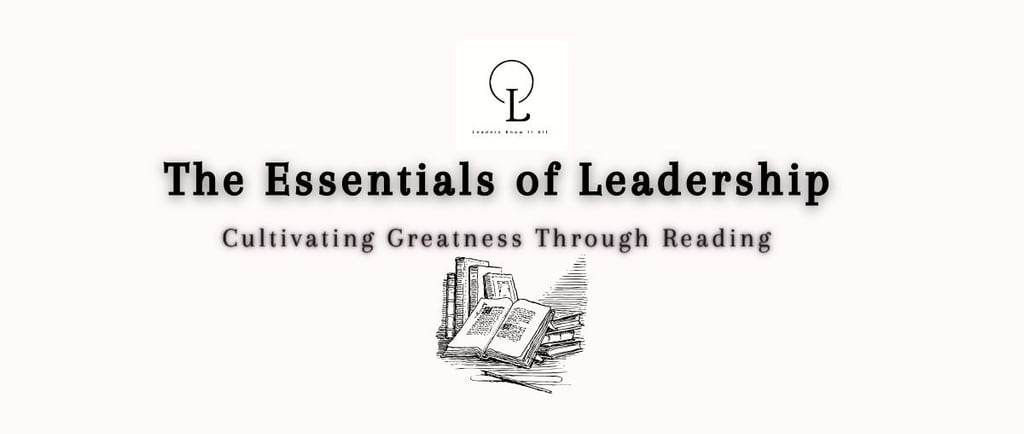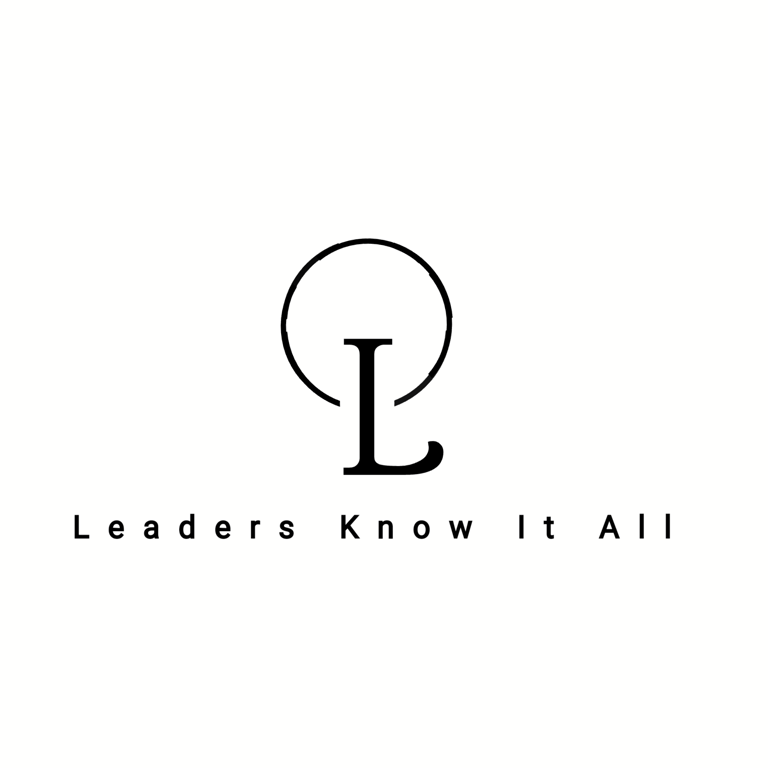The Essentials of Leadership: Cultivating Greatness Through Reading
Leadership is a skill that can be developed and honed through various means. While there are many ways to improve one's leadership abilities, one often overlooked and yet highly effective method is through reading. By spending time with books, particularly biographies of great leaders, individuals can gain invaluable insights and wisdom that can help them become better leaders and better people overall.
SUCCESSLEADERSHIPHOW TO BECOME A GOOD LEADEREFFECTIVE LEADERSHIPGOOD LEADERLEADERSHIP TRAITSLEADERSHIP SKILLSSKILL DEVELOPMENTBECOMING A LEADERLEADERSHIP QUALITIESBOOK READING
leaders know it all
1/21/20243 min read


Leadership is a skill that can be developed and honed through various means. While there are many ways to improve one's leadership abilities, one often overlooked and yet highly effective method is through reading. By spending time with books, particularly biographies of great leaders, individuals can gain invaluable insights and wisdom that can help them become better leaders and better people overall.
The Importance of Reading
Reading is a fundamental activity that has been cherished for centuries. It not only expands our knowledge and understanding of the world, but it also stimulates our imagination and enhances our critical thinking skills. When it comes to leadership, reading can provide a wealth of benefits that contribute to personal and professional growth.
Firstly, reading exposes us to different perspectives and ideas. By delving into the lives of great leaders through biographies, we can learn from their successes and failures, their triumphs and challenges. This exposure to diverse experiences broadens our understanding of leadership and helps us develop a more nuanced approach to our own leadership style.
Secondly, reading enhances our communication skills. Effective leadership requires the ability to articulate ideas clearly and persuasively. By immersing ourselves in well-written books, we can absorb the nuances of language and learn how to express ourselves with clarity and impact.
Furthermore, reading stimulates our creativity. Great leaders are often known for their ability to think outside the box and come up with innovative solutions. By immersing ourselves in literature, we expose ourselves to different worlds and ideas, which can spark our own imagination and fuel our creativity.
The Power of Biographies
While reading in general is beneficial for leadership development, biographies hold a special place in this regard. Biographies offer us a window into the lives of remarkable individuals who have made a significant impact in their respective fields.
By reading biographies of great leaders, we gain insight into their journeys, their struggles, and the qualities that made them exceptional. We learn about their resilience, their ability to overcome obstacles, and their unwavering determination. These stories serve as a source of inspiration and motivation, showing us what is possible when we embrace the qualities of a good leader.
Moreover, biographies often provide valuable lessons that can be applied to our own lives and leadership roles. They offer a unique perspective on decision-making, problem-solving, and the importance of integrity and ethics in leadership. By studying the lives of great leaders, we can extract principles and strategies that can guide us on our own leadership journey.
Cultivating Good Leadership Habits
Reading books alone is not enough to become a good leader. It is the application of the knowledge gained from reading that truly makes a difference. Here are some qualities and habits that can be nurtured through reading:
Continuous Learning
Great leaders never stop learning. By dedicating time each week to reading, we embrace a mindset of continuous growth and improvement. We stay informed about current trends, industry developments, and new ideas, which allows us to adapt and innovate in our leadership roles.
Self-Reflection
Reading biographies of great leaders prompts us to reflect on our own strengths and weaknesses. We can identify areas for improvement and set goals for personal and professional development. Self-reflection is a crucial habit for leaders, as it allows us to be self-aware and make conscious choices that align with our values and vision.
Empathy and Emotional Intelligence
Through reading, we gain insights into the lives and experiences of others. This exposure to different perspectives cultivates empathy and helps us develop emotional intelligence. Understanding the emotions and motivations of others is essential for effective leadership, as it enables us to build strong relationships and inspire trust.
Critical Thinking
Reading encourages critical thinking, as we analyze and evaluate the ideas presented in books. This skill is vital for leaders, as they often face complex challenges that require thoughtful consideration and strategic decision-making. By honing our critical thinking abilities, we can navigate uncertainty and make informed choices that benefit our teams and organizations.
In conclusion, reading is a powerful tool for leadership development. By spending time with books, particularly biographies of great leaders, individuals can gain valuable insights, expand their knowledge, and cultivate qualities that contribute to effective leadership. Reading not only enhances our communication skills and stimulates our creativity, but it also provides us with valuable lessons and inspiration from the lives of remarkable individuals. So, let us embrace the power of reading and unlock our potential as leaders.
Love and Light
LKIA
